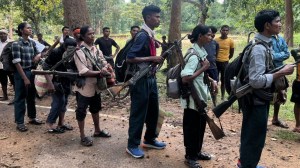Thanksgiving time for Sharon
One hot summer morning in Haifa three years ago, a group of Bene Israelis from Bombay turned out to greet travelling Indian journalists with...

One hot summer morning in Haifa three years ago, a group of Bene Israelis from Bombay turned out to greet travelling Indian journalists with stories of their recharged lives since they had migrated to Israel in the late 1960s. The older women, dressed up in salwar-kameezes, fed us handmade namkeen savouries and in Marathi and Hindi pressed us for stories about the mother country. In the beginning, they admitted, Israel8217;s Ashkenazi Jews would look down upon their dark-skinned compatriots such as themselves Israel recognised the Bene Israelis as 8216;8216;genuine Jews8217;8217; in 1964, although now, beamed a teenager showing off a bronzed arm, 8216;8216;Indian Jews are so much more popular!8217;8217;
Seems Israeli Prime Minister Ariel Sharon is all set to return the compliment when he arrives in New Delhi on a breakthrough visit from September 7-11, on a trip that also takes him to Agra and Mumbai. During this last leg 8212; he flies back home from Mumbai 8212; Sharon will do the business thing, meeting key chambers CII and FICCI. Most interestingly, he will get together with members of the 6,000-odd Jewish community 8212; such as poet Nissim Ezekiel and Bunny Reuben .
The history of the Jewish community in India is said to date from 1000 BC when Jews took off from the Straits of Hormuz and landed in the Malabar coast. Both Kerala and Konkan are still littered with Jewish sites, although most records were destroyed in turns by Muslim overlords, the Roman Catholic Portuguese and Dutch colonialists. Sharon may or may not visit the Keneseth Eliyahoo synagogue in Colaba there are 7 in Mumbai, the Sassoon Library or the Sassoon Docks 8212; a Baghdadi Jew named David Sassoon who emigrated to Bombay in 1832 built these landmarks with the money he made serving the British empire 8212; but he is expected to thank the people of India for showing tolerance towards the Jewish community over the centuries.
Lahiri lengthens Sibal8217;s tenure
And so the grapevine on which hangs the story about India8217;s next Foreign Secretary gets longer and longer. This week8217;s version has it that present incumbent Kanwal Sibal is likely to get an extension 8212; or contract, or reemployment, as the MEA will have it 8212; beyond November, when he should have retired. Seems as if the decision to give India8217;s Ambassador in France Savitri Kunadi another six months she was to retire this month-end till March, was what helped tip the scales in Sibal8217;s case. Next in line after Sibal, Dilip Lahiri, is now likely to go to Paris when Kunadi finally gives over. Also around March, India8217;s Ambassador to the US Lalit Mansingh ends his three-year tenure, which is when the race for Washington will hot up again. By then April would have arrived, and that as we all know, is the cruellest month.
How Anju could8217;ve stumbled
To think that Anju Bobby George, India8217;s world-class long jumper, may have never got a shot at her bronze 8212; and India8217;s first athletic medal 8212; if the MEA8217;s San Franscisco consulate led by S. Vishwanadhan had been allowed its callous routine. On the other hand, if Minister of State in the MEA Vinod Khanna8217;s secretary Arun Malhotra and Gurjit Singh, India8217;s Deputy Chief of Mission in Rome, hadn8217;t gone out of their way to help Anju get her visas to compete in the European circuit before the world championships, she would have been just another girl from India8217;s picturesque Kerala backwaters. Turns out that about a month ago, while training at the US with the world-class long-jumper Mike Powell, Anju was told it would be a good idea to compete in Rome. Since she didn8217;t have an Italian visa, she sent off a fax to the San Fransisco mission, following it up with a call. We haven8217;t received any fax, an officer at the consulate told her, please try Delhi. At the Sports ministry, she drew a blank. Finally, at the end of their tether, she tried Khanna8217;s office. Directions were sent to Viswanadhan, who finally delivered. Once in Rome, Gurjit took over, helping her out with visas for nations where she was to compete. His efforts enabled Anju to get there to thrash the competition. That8217;s how in Paris on the weekend, she was brimming with confidence 8212; and why she did India proud.
- 01
- 02
- 03
- 04
- 05































